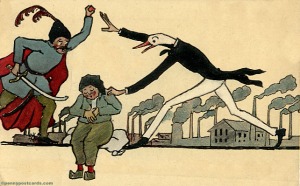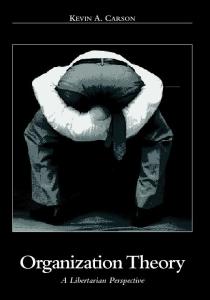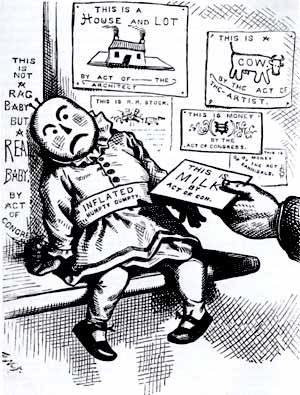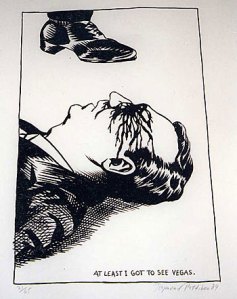 Capitalism is dead, consumerism is king.
Capitalism is dead, consumerism is king.
-Aldous Huxley, Brave New World Revisited
The great disease of modern life is that coercive institutions, or institutions which ultimately derive from and reap the spoils of coercion, are justified to the masses on the basis that they serve the needs of people both collectively and individually. But even when they most obviously cease to do this (public education, high finance, national defense, representative democracy), they are not done away with, and only halfheartedly, slowly, and irrationally are they reformed. Indeed, it should be obvious to anybody upon a moments reflection that none of our institutions- not a one- actually serve any need of ours. We serve their needs. We must change for their sake, for they will never (barring a crisis, which may be forthcoming) change for ours. For instance, I wrote a couple of months back:
“Keynesian policy insists that if aggregate demand falls, producers should not scale back or close up shop, but rather the government should pump them full of funny money to keep them going. Does this not mean that we are to serve a preconceived, ideal structure of production, rather than having it serve us? Does it not make a fetish of ceaseless GDP-growth at the expense of actual human desires? . . . How is it that few have called this an absurdity on its face? I am reminded of Chesterton’s critique of his friend and intellectual sparring-partner George Bernard Shaw’s ideas of progress:
Having come to doubt whether humanity can be combined with progress, most people, easily pleased, would have elected to abandon progress and remain with humanity. Mr. Shaw, not being easily pleased, decides to throw over humanity with all its limitations and go in for progress for its own sake. If man, as we know him, is incapable of the philosophy of progress, Mr. Shaw asks, not for a new kind of philosophy, but for a new kind of man. It is rather as if a nurse had tried a rather bitter food for some years on a baby, and on discovering that it was not suitable, should not throw away the food and ask for a new food, but throw the baby out of window, and ask for a new baby.”
I have just begun to read Kevin Carson’s book on organization theory, which begins by challenging assumptions shared, oddly, by many Marxists, corporate liberals, and libertarians, about economies of scale- in short, that a modern economy requires the organization of capital on a massive scale. To the vulgar libertarian, this means that gargantuan corporations are destined to stand triumphantly astride the globe, and only a motley crew of petty Washington bureaucrats and deluded left-liberal dreamers in American universities and the media conspiring with leftist demagogues and ignorant peasants in the third world could complain about it. To the vulgar Marxist this means that the bourgeoisie does their historically appointed role of dragging those same peasants kicking and screaming into the modern world before duly stepping aside and into the guillotine so that the proletariat can take over the means of production. The corporate liberal . . . well, we’ll get to that. I haven’t yet absorbed Carson’s full dissenting argument about economies of scale, but I find a quote from Keynesian John Kenneth Galbraith which relates to my point about how the people are made to serve the institutions rather than the other way around.
The need to control consumer behavior is a requirement of planning. Planning, in turn, is made necessary by extensive use of the advanced technology and capital, and by the relative scale and complexity of organization. . . . Thus it comes about that, as the industrial system develops to the point where it has need for planning and management of the consumer that this requires, it is also serving wants which are psychological in origin, and hence admirably suited to management and by appeal to the psyche.
A feverishly paranoiac and primitive brain, such as the one I possess, would be tempted to recall Huxley’s infamous- but quite misunderstood- consumerist and administrative dystopia Brave New World where the needs and tastes of the public are not left to chance, but rather inculcated in the very womb- or rather, in public hatcheries where budding little humanoids receive behaviorist conditioning and hypnopoedic instruction.
In the nurseries, the Elementary Class Consciousness lesson was over, the voices were adapting future demand to future industrial supply. “I do love flying,” they whispered, “I do love flying. I do love having new clothes, I do love . . .
This is Galbraith’s “planning and management of the consumer” taken to its logical conclusion. Of course Galbraith is famous for an essay called “The Dependence Effect” where he complains that corporations don’t really sell people what they want, but rather insidiously use advertising to tell consumers what they want. Hayek dismissed Galbraith’s claim as a “non-sequitir“, and Murray Rothbard concurred, but I think they should have taken him more seriously. After all, it’s not as if Galbraith, as a Keynesian corporate liberal, is against this manipulation per se, but only wishes it to entrust it to wise technocrats- the Mustapha Monds and Benito Hoovers of the world- instead of greedy Madison Avenue types (or perhaps in partnership with them). Far from wanting to abolish corporate capitalism, Galbraith sees some purpose in it other than that intended by the capitalists.
. . . a benign providence . . . has made the modern industry of a few large firms an excellent instrument for inducing technical change. It is admirable equipped for financing technical development. . . . Technical change has long since become the preserve of the scientist and engineer . . .
Not for Galbraith a decentralized and competitive economy. You won’t see him bandying the rallying cry “Small is Beautiful” or desiring “human scale” technology and industry. Indeed, “there must be some element of monopoly in an industry if it is to be progressive.” Carson writes about how Galbrath’s “New Industrial State” takes the economy out of the hands of the consumer, whom it ostensibly serves.
For Galbraith, the “accepted sequence” of consumer sovereignty, or Misesean “dollar democracy,” in which consumer demand determines what is produced, has been replaced by a “revised sequence” in which oligopoly corporations determine what is produced and then dispose of it by managing consumer behavior. In contemporary terms, the demand-pull economy is replaced by a supply-push model.
But what is this progressive inducement of “technical change”? It behooves us to return to Huxley’s nightmare conception of the highest state of liberal technostructure. From his introduction to the 1946 to Brave New World (first published in 1932):
All the existing patterns of human life will have to be improvised to conform with the nonhuman fact of nuclear power. Procrustes in modern dress, the nuclear scientist will prepare the bed on which mankind must lie; and if mankind doesn’t fit- well, that will be just too bad for mankind. There will have to be some stretching and a bit of amputation- the same sort of stretching and amputations as have been going on ever since applied science really got going into its stride, only this time they will be a good deal more drastic than in the past. These far from painless operations will be directed by highly centralized totalitarian governments.
That the specific technology that concerns Huxley is nuclear power is irrelevant. What is relevant is how often the Procrustean theme is sounded in relation to technology. In playing the liberal technocrat as scientific Procrustes, Galbraith is in a long line going back to at least August Comte, and especially in America John Dewey, who saw the purpose of modern education as preparing the individual for the “conflict between institutions and habits originating in the pre-scientific and pre-technological age and the new forces generated by science and technology” (Liberalism and Social Action). These “institutions and habits” are clearly what Huxley meant by “existing patterns of human life” or in other words, what we would all be doing if scientific social planners didn’t come along to dragoon us into schools and corporations and the military. (Or, let me be more sophisticated about it, allowing us to choose which of these wonderful career paths we’d prefer after they’ve destroyed all the alternatives they don’t like.) Speaking of schools, it’s important to note that these precursors to Huxley’s mass hatcheries and conditioning centers are what dissident teacher John Taylor Gatto has called an “administrative utopia”, which he describes in Procrustean terms as,
a peculiar kind of dreaming by those in power, driven by an urge to arrange the lives of others, organizing them for production, combat, or detention. The operating principles of administrative utopia are hierarchy, discipline, regimentation, strict order, rational planning, a geometrical environment, a production line, a cellblock, and a form of welfarism. Government schools and some private schools pass such parameters with flying colors.
Huxley later called his World State the “welfare-tyranny of Utopia”, which is what Gatto appears to be describing. Actually, many of our institutions pass such parameters. It also recalls Michel Foucault’s famous observation, (glib and grandiose like most things he said, but resonates nonetheless) “Is it surprising that prisons resemble factories, schools, barracks, and hospitals, which all resemble prisons?”
(By the way, if you doubt the authoritarian streak in modern liberals, try an experiment and tell one that you don’t believe anyone should be forced to go to school.)
Carson addresses the issue of the Austrians dismissal of things like advertising and the dependence effect when it comes to corporations managing consumer demand, insisting that not only do the former get great assistance from the state but that they should be viewed as part of the same apparatus of propaganda as the government schools austro-libertarians complain about.
. . . government schools and the USDA were integrally involved in the effort to manufacture a mass consumer culture. The USDA through most of the 20th century conducted a large-scale barrage of cheerful, taxpayer-funded agitprop on behalf of the denatured, factory-farmed produce of corporate agribusiness, with propaganda handouts as late as the 1970’s dismissing as “myths” the belief that some foods (e.g., bleached white flour) were less nutritious than others, or that soil depletion affected the nutritional quality of food. Home economics classes from the 1920’s on stigmatized home-grown vegetables and home-baked bread as old-fashioned and atavistic, and heralded the modern, up-to-date housewife who fed her family scientifically out of tin cans.
Recall Dewey’s desire to rid the populace of its “pre-scientific and pre-technological” habits. The politics of food-production and consumption and its environmental and health effects have become important in recent years with popular books like The Omnivore’s Dilemma. Usually these issues are pushed by liberal critics of the market, and dismissed by its defenders. But as we see, not only is the situation not a natural outgrowth of free-market conditions, but is another instance (along with urban sprawl) of liberals trying to remedy a problem their intellectual predecessors helped to create.

Taking our cues from Galbraith and Huxley, we really should see government and business leaders as co-captains of the corporatist ship, which explains why Keynesian economics, with its obsession with “full employment” and insistence on perpetual spending and no consumer saving, makes the most sense for this system. Carson quotes from Jeffrey Kaplan article called “The Gospel of Consumption” that describes how business leaders were upset to discover that the basic needs of consumers could probably be taken care of with “three days work a week”. National Association of Manufacturers President John E. Edgerton set the tone for elite opinion, both governmental and corporate:
“I am for everything that will make work happier but against everything that will further subordinate its importance. The emphasis should be put on work- more work and better work.” “Nothing,” he claimed, “breeds radicalism more than unhappiness unless it is leisure.”
Apparently it never occurred to Edgerton that one of the things which might make work happier is the subordination of its importance. At any rate, more work (if not better work) has always been at the top of the Keynesian agenda. Ever wonder why unemployment per se should really be such a vexing problem? What if we really don’t want to work all that much? Edgeton’s words could come right out of the mouth of Huxley’s World Controller Mustapha Mond, and indeed Mond, explaining the operating principles of Brave New World to John the Savage, describes their economy in similar terms:
“Technically, it would be perfectly simple to reduce all lower-caste working hours to three or four a day. But would they be any happier for that? No, they wouldn’t. The experiment was tried, more than a century and a half ago. The whole of Ireland was put on to the four hour day. What was the result? Unrest and a large increase in the consumption of Soma; that was all. Those three and a half hours of extra leisure were so far from being a source of happiness taught people felt constrained to take a holiday from them. The Inventions Office is stuffed with plans for labour-saving processes. Thousands of them.” Mustapha Mond made a lavish gesture. “And why don’t we put them into execution? For the labourers; it would be sheer cruelty to afflict them with excessive leisure. . . .
What compassion for the happiness of the workers! And Big Brother surely loves them, too. Perhaps also, though, the workers might in their leisure time, rather than drugging themselves with the state-provided intoxicant, contemplate what a bizarre society they live in and how it might be made different, and what exactly they needed these World Controllers for. Obviously that would be the beginning of the end for Brave New World.
Of course all this work should not indicate that there ought to be no play. One of the most prominent features of Brave New Worlders is their promiscuity, addiction to fleeting pleasure and childlike need for instant gratification. Mond says “Industrial civilization is only possible when there’s no self-denial. Self-indulgence up to the very limits imposed by hygiene and economics. Otherwise the wheels stop turning.” Spend spend spend! The thrifty are robbers of the public good! More credit! More debt! Hence also the obsession with never having “idle resources”. What a neat arrangement: Huxley’s Keynesian utopia simultaneously achieves the goals of the state, the corporation, and the counterculture. Huxley later wrote, “As political and economic freedom diminishes, sexual freedom tends compensatingly to increase. And the dictator (unless he nees cannon fodder and families with which to colonize empty or conqured territories) will do well to encourage that freedom.” I am amazed at how much Huxley got right. With the “unless he needs cannon fodder” proviso he even foresaw the neoconservatve program of family values!
Another text that is brought to mind is one that does not have a high reputation with libertarians: Adorno and Horkheimer’s essay “The Culture Industry” from Dialectic of Enlightenment. I must confess I reacted very strongly against it when I first encountered it. But it basically applies the Procrustean theme (and the Dependence Effect) to radio, movies, television, and publishing:
It is alleged that because millions participate in it, certain reproduction processes are necessary that inevitably require identical needs in innumerable places to be satisfied with identical goods. The technical contrast between the few production centers and the large number of widely dispersed consumption points is said to demand organization and planning by management.
When I first read this, I thought, “alleged by who?” But even then, in my vulgar libertarian phase, I should have known who. Of course Adorno and Horkheimer do not examine the role of the state in concentrating “production centers” or extol the virtues of a freed market. But in school I wrote a reaction essay about how they did not understand “how the market works” which involves feedback mechanism and Hayekian disbursed knowledge and so on and would not allow the culture industry such a captive audience, which I now see as an overly rosy view of the current market. That’s how culture would work in a free market, but we do not have anything close to a free market. The culture industry described by Adorno and Horkheimer is precisely the Galbrathian model “in which oligopoly corporations determine what is produced and then dispose of it by managing consumer behavior.” (I should note that in media we do have a much more competitive market than when the essay was written in 1944, and also that Adorno’s pessimism and snobbery colors everything he wrote, including and especially this essay. Even during that low period in modern life, culture never was quite “a system which is uniform as a whole and in every part” as bombastically claimed.)
 Speaking of culture, I don’t want to get into where exactly the management of mass society is heading, but I would look to the denizens of Brave New World for a clue. Chesterton accused Shaw of desiring “a new baby” and the phrase is apt to describe both the products of Huxley’s “welfare-tyranny of Utopia” (as he brilliantly put it in the 1946 intro) and the culture industry of America today. (By the way, Jeffrey Herbener suggests in a speech* that Keynes’s Utopian goal with things like aggregate demand-management and the socialization of investment was to make people more present-oriented, less action-oriented, and to bring about a society of instant gratification. The old romantic dream of the death of homo-economicus could well become Huxley’s nightmare of “false, lying happiness” or Adorno’s “ecstasy without content”*.)
Speaking of culture, I don’t want to get into where exactly the management of mass society is heading, but I would look to the denizens of Brave New World for a clue. Chesterton accused Shaw of desiring “a new baby” and the phrase is apt to describe both the products of Huxley’s “welfare-tyranny of Utopia” (as he brilliantly put it in the 1946 intro) and the culture industry of America today. (By the way, Jeffrey Herbener suggests in a speech* that Keynes’s Utopian goal with things like aggregate demand-management and the socialization of investment was to make people more present-oriented, less action-oriented, and to bring about a society of instant gratification. The old romantic dream of the death of homo-economicus could well become Huxley’s nightmare of “false, lying happiness” or Adorno’s “ecstasy without content”*.)
But the question should be asked, does technological society actually require reconstructing humanity? Not at all, if it is emergent, decentralized, voluntary. At the time he wrote his dystopia, Huxley gave us only one other option to the perpetual babyhood of consumerist civilization, which is the primitive mysticism of John the Savage, who ends the book flagellating himself like some visionary monk from the middle ages. The average libertarian, who is a committed rationalist (as I am) is likely to say, “No thanks, I’ll take my chances with the feelies and centrifugal bumble-puppy and sex-hormone chewing gum thank you.” (And no doubt many “cosmopolitan” Reasonoids would find Huxley’s World State a fairly groovy place to live.) But though Huxley never rid himself of his mystic streak or discomfort with technological civilization (which probably involved some family romance issues, given Huxley’s lineage), by his 1946 introduction he had come to regret not providing a “possibility of sanity”. For his third option he invoked two names well known to left-libertarians. “In this community economics would be decentralist and Henry-Georgian, politics Kropotkinesque and co-operative.” This would be close to the mutualism Carson is arguing for. Now I’m not a mutualist, but I have some mutualist sympathies, and certainly I’d take Carson’s, or even Kropotkin’s, version of anarchy over the Brave New World Order prepared by the Procrustean technocrat any day of the week.
*You’ll have to scroll to about 3/4ths of the way through to get to the part about Keynes.
* A phase which appears in a dour but fascinating Adorno essay from the 1930s called “The Fetish-Character in Music and the Regression of Listening” which assails the taste for pop as well as a prototype of the tech-geek, the “ham radio enthusiast”.


 I’ve often wondered why most literary and cultural theory is Marxist. Conservative claims notwithstanding, most academic intellectuals, especially those in the humanities, are not Marxists. They are not radicals, mostly, but rather polite NPR-listening Democrats. So why isn’t there, for instance, a Keynesian critical theory? A post over at the blog
I’ve often wondered why most literary and cultural theory is Marxist. Conservative claims notwithstanding, most academic intellectuals, especially those in the humanities, are not Marxists. They are not radicals, mostly, but rather polite NPR-listening Democrats. So why isn’t there, for instance, a Keynesian critical theory? A post over at the blog 
 Capitalism is dead, consumerism is king.
Capitalism is dead, consumerism is king. 

 Speaking of culture, I don’t want to get into where exactly the management of mass society is heading, but I would look to the denizens of Brave New World for a clue. Chesterton accused Shaw of desiring “a new baby” and the phrase is apt to describe both the products of Huxley’s “welfare-tyranny of Utopia” (as he brilliantly put it in the 1946 intro) and the culture industry of America today. (By the way, Jeffrey Herbener suggests in a
Speaking of culture, I don’t want to get into where exactly the management of mass society is heading, but I would look to the denizens of Brave New World for a clue. Chesterton accused Shaw of desiring “a new baby” and the phrase is apt to describe both the products of Huxley’s “welfare-tyranny of Utopia” (as he brilliantly put it in the 1946 intro) and the culture industry of America today. (By the way, Jeffrey Herbener suggests in a 

